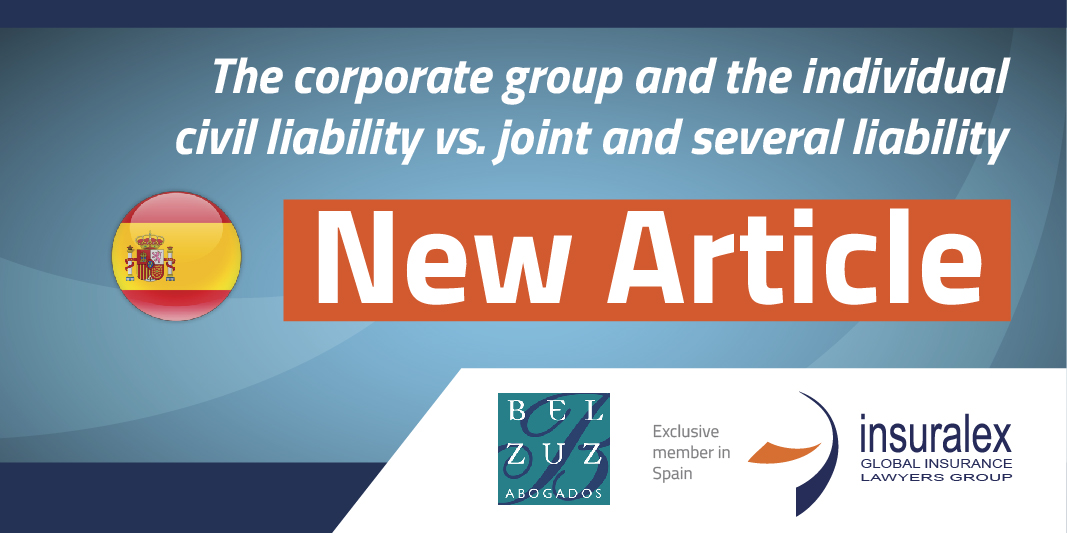
The civil liability that may arise within a specific company that is a part of the corporate group operating under one trade name, in many occasions raises questions when determining which entity must respond in the event of a civil liability case.
At Belzuz Abogados Insurance Law Department, we have analysed the case when the civil liability is demandable from an entity part of a corporate group.
The issue that arises is whether the injured party claim must be addressed to the group company involved in the events or it may be addressed to any company in the group.
This issue is particularly important in many occasions because, due to reasons of proximity or judicial competence, it is more convenient for the appellant to address the group company of their area or nationality.
We cannot ignore the fact that the allegedly responsible company being part of a corporate group or operating in the market under one brand, means that the injured party may address to any of the companies in the group to demand the liability one of them might have incurred.
In other words, we cannot address any company part of a corporate group in order to eventually claim, since we could only address the entity involved in the events and allegedly liable for the damages claimed.
Assumptions:
-
- 1.-There is a clear distinction between the companies that are part of a corporate group, even when sharing a registered address.
-
- 2.-Even if the companies have the same brand or registered address, there are no bonds which effectively make their different entities irrelevant
-
- 3.- The fact that it is one corporate group already implies the different entity of each company, remaining clear that the company group doesn’t invalidate the different legal entities of the companies and procedurally, neither fungibility or interchangeability of any kind can exist among them nor their different entities may be mixed.
-
- 4.-In accordance with the strong case-law of the Spanish courts, not even the parent company may be liable for the actions and activities of the companies in the same corporate group; if the parent company cannot be liable of the activities of their subsidiaries, it can hardly be considered that two companies in the same group may be liable to each other.
Case law:
We highlight the Judgement of the 8th Section of the Valencia Provincial Court, of 12 April 2011, which declares as follows:
“The defendant is a subsidiary of RJ xxxxxxx SPA, with a legal entity different from the parent company. The defendant is not a branch of the Italian company but a subsidiary with legal independence and different contractual responsibilities.”
The Judgement of the 1st Chamber of the Supreme Court, of 28 February 2014, recalls that the general rule must be respecting the legal entity of capital companies and the rules on the scope of the liability for the duties taken by such entities that neither does not affect their shareholders and directors, nor the companies that may belong to the same group. (in the same vein, Judgements 796/2012, of 3 January 2013 EDJ 2013/10422, and 326/2012, of 30 May EDJ 2012/109286).
Supreme Court, 1st Chamber, S 17-7-2014, no. 429/2014, rec. 2275/2012 Pte: Sarazá Jimena, Rafael
Corporate group. Debts offsetting. The Supreme Court rejects the cassation appeal filed by the co-defendant entities and declares that a claim for payment is appropriate. The fact that the co-defendant, debtor of the outstanding price of a purchase, and the creditors of the seller, due to loans and surety bonds, are part of one corporate group, doesn’t mean that there are only two parties in the agreement and that the credits which the group companies hold against the seller may be offset with the credits that the seller holds against the co-defendant under the sale, as if the corporate group had only one legal entity and one equity.
-. We may conclude that in the scope of duly verified civil liability, which may correspond to a legal entity that is a part of a corporate group, the liability is only demandable from the entity which took part in the events, act or omission, from which the harmful result arises, “… the causal link being duly verified, but in no event would it be demandable, as established by doctrine, from other entities of the corporate group with clearly different legal entities, even if they operate under the same brand and/or share a registered address.”
These considerations are particularly important when determining to which entity of the corporate group the action is addressed, in order to avoid relying on exceptions due to the lack of eligibility for election by the defendant company, which being part of the corporate group, it didn’t take part in the events.
Lastly, we refer to the remedy of prescription, which becomes critical in this context, because the notice addressed to one of the companies of the corporate group does not interrupt the action regarding the company directly involved in the events if the latter has not been informed.
In order to avoid subsequent errors when leading the action, there are procedural inquiry mechanisms such as the pretrial proceedings that are provided for the plaintiff to prepare a trial and that are covered in articles 256 to 263 of the Spanish Law 1/2000, of 7 January, on Civil procedure (LEC)
At Belzuz Abogados Insurance Law Department, we can advise and assist you on these (and other) cases where the corporate networks may give rise to confusion regarding the entities to which claims must be addressed and which must be taken to court, as well as advise the insurance companies and insurance distributors, which are claimed or filed in order to dispel doubts and raise the appropriate exceptions regarding the issue we have briefly analysed.
Belzuz Abogados SLP Insurance Law Department
Jose Garzón García
Partner



